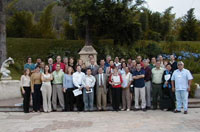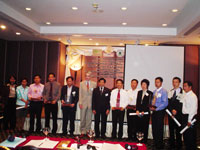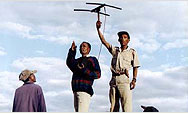
|
Global Climate Change: Capacity Building
 Participants at USAID sponsored workshop on Mbase and ProForm held in Guatemala (2003). Lynn Price, LBNL
Overview
According to the United Nations Conference on Environment and Development, building a country’s capacity
… encompasses a country’s human, scientific, technological, organizational, institutional, and resource capabilities. A fundamental goal of capacity building is to enhance the ability to evaluate and address the crucial questions related to policy choices and modes of implementation among development options, based on an understanding of environment potentials and limits and of needs perceived by the people of the country concerned.(1)
Capacity building for climate change refers to the development or strengthening of personal skills, expertise, and relevant institutions and organizations to reduce greenhouse gas (GHG) emissions and/or to reduce vulnerability to climate-related impacts. Capacity building often involves the participation of multiple stakeholders, including host country governments, nongovernmental organizations (NGOs), research institutions, local communities, and international organizations.
 ICLEI’s Cities for Climate Protection Southeast Asia Regional Workshop: Integrated Actions for Local Energy Security and Global Sustainability, Bangkok, Thailand. Duane Muller, USAID
USAID’s Approach
Building human and institutional capacity to address climate change is a fundamental component of USAID’s Global Climate Change Program. Capacity building cuts across many of the issues under consideration in the climate change process, including activities focused on GHG mitigation, technology transfer, land-based carbon sequestration, vulnerability and adaptation to climate impacts, and climate change science.
In response to the broad range of needs expressed by developing and transition countries, USAID’s Global Climate Change Program is helping to address climate change concerns by integrating capacity building into its sectoral activities through education, training and outreach activities. USAID has sponsored workshops and training seminars in over 40 countries throughout the world, providing developing and transition countries with the knowledge and skills to address climate change and meet their responsibilities under the United Nations Framework Convention on Climate Change (UNFCCC). Training has addressed the development and transfer of technologies; vulnerability and adaptation to climate impacts; monitoring and evaluation of GHG emissions; and the economics of climate change. In all of these areas, the Agency has placed particular emphasis on partnerships with the private sector and on working with local and national authorities, communities, and NGOs to create alliances that build upon the relative strengths of each. Training and technical assistance programs often support demonstration activities that strengthen in-country capacity, as well as promote strategic partnerships, education and outreach, technology cooperation and research. USAID’s unique network of in-country field missions creates a long-term presence that serves to build trust between the United States and in-country partners, from government officials to local citizens. This approach helps improve the odds that development partners will continue to implement relevant projects long after USAID support has ended.
The United States has been a signatory to the UNFCCC since 1992 and was the first industrialized nation to ratify the Convention. Because participation by the majority of countries is essential to successful implementation of the UNFCCC, a key element of the Agency’s efforts in the area of climate change is to build the capacity of developing and transition countries to help them meet their responsibilities under the UNFCCC. In addition, section 2(d) of Article 9 of the UNFCCC calls on parties to provide advice on “ways and means of supporting endogenous capacity building in developing countries,” while Article 6 states that parties shall promote, and as appropriate, facilitate and cooperate on education, training, outreach, and public awareness.
USAID’s Global Climate Change Program is addressing many of these issues. From 1998 to 2002, USAID helped build climate change-related capacity by sponsoring over 10,000 training and technical assistance activities worldwide. For example, in Ukraine, USAID supported the establishment of the Climate Change Initiative (CCI), which serves as a support resource for the Government of Ukraine in its efforts to develop a sound national climate change program. The CCI includes three key components: a training program, a Web site, and an information and project management center. The CCI’s training program supports courses on climate-related topics such as GHG mitigation, GHG inventories, economics, and baselines. The CCI Web site includes articles on different aspects of climate change, analyses of sources of GHG emissions in Ukraine, a database of all climate activities in Ukraine, a pipeline of potential GHG mitigation projects, a copy of the training modules, and other valuable information and links on climate change. The information and project management center provides Ukrainian officials and NGOs with translations of UNFCCC documents and other climate change materials, including a monthly electronic newsletter. These materials have been invaluable to Ukraine in its participation in the UNFCCC negotiations. The CCI has helped establish strong working relationships with key individuals and institutions such as the Ministry of Ecology and Natural Resources, the Ministry of Fuel and Energy, the Parliament, regional and city administrators, NGOs, industrialists, and entrepreneurs, which has led to a greater awareness of climate change issues throughout Ukraine.
Related Links
Disclaimer of Endorsement
The pages and documents posted on this Web site may contain links or references to information created and maintained by other public and private organizations, which do not necessarily reflect the views of USAID.
USAID is also building capacity in Brazil through support for the Brazil Energy Training and Outreach Program (BETOP). BETOP has implemented approximately 45 outreach activities that include training courses, workshops, and seminars to over 1,600 participants from 350 private and public Brazilian organizations. These training and outreach activities have addressed issues such as clean energy policy and regulation, energy efficiency, and project finance. BETOP activities were implemented in partnership with over 20 local organizations, including, among others, state industry federations, Brazilian universities, international donors, private sector companies, and research institutes. Training themes included economic aspects of climate change, an Amazon perspective of global climate change, and the business perspective of climate change. The workshops were designed to increase the Brazilian knowledge base on developing clean energy and climate mitigation projects, while promoting greater integration and involvement of public institutions in the climate change debate. As a result, the private sector in Brazil is more aware of climate change and of the cost- effective mitigation opportunities in both the energy and land-use sectors.
Conclusion
Ukraine’s CCI and BETOP in Brazil are just two of many examples of USAID’s successful approach to capacity building for climate change. The Agency continues to help developing and transition countries address climate-related concerns as an integral art of their development goals continues. By integrating capacity building into its Global Climate Change Program, USAID is ensuring that climate concerns will be addressed for many years to come.
Footnote
1. Capacity Building – Agenda 21’s definition (Chapter 37, UNCED, 1992.)
Please note, many links in the Global Climate Change portion of USAID's web sites point to information on the U.S. State Department and White House web sites. Some of these materials may be under review and temporarily unavailable. These links will be updated on USAID's web sites as soon as possible. Thank you for your patience.
Back to Top ^
|




